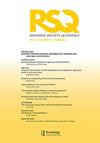Feminist Witnessing from the Bench: A Study of Judge Aquilina’s Epideictic Rhetoric in the Nassar Sentencing Hearing
IF 1.1
2区 文学
Q3 COMMUNICATION
引用次数: 0
Abstract
ABSTRACT During a 2018 sentencing hearing of former Olympics and Michigan State University doctor Larry Nassar, 156 survivors offered Victim Impact Statements, and Judge Rosemarie Aquilina made national headlines for her impassioned responses to each survivor. This essay shows how Aquilina’s responses use epideictic rhetoric to make audible a judicial practice of feminist witnessing of assault testimony. In so doing, Aquilina challenges the way blame “sticks” to survivors and casts a scrutinizing gaze on a culture that silences survivors; praises the individual act of testimony and constitutes a collective of “sister survivors,” thereby fostering connection and potential for coalition building; and reframes sexual assault testimony as a public act with socially transformative effects.法官席上的女性见证——对阿奎利纳法官在纳萨尔量刑听证会上的流行病学修辞研究
摘要在2018年前奥运会和密歇根州立大学医生拉里·纳萨尔的宣判听证会上,156名幸存者发表了受害者影响声明,法官罗斯玛丽·阿奎利娜因其对每一位幸存者的慷慨激昂的回应而登上了全国头条。本文展示了阿奎利娜的回应如何使用外延修辞,使女性主义者对袭击证词的见证成为一种司法实践。在这样做的过程中,阿奎利娜挑战了指责“坚持”幸存者的方式,并仔细审视了一种让幸存者沉默的文化;赞扬个人的作证行为,并构成“姐妹幸存者”的集体,从而促进建立联盟的联系和潜力;并将性侵证词重新定义为具有社会变革影响的公共行为。
本文章由计算机程序翻译,如有差异,请以英文原文为准。
求助全文
约1分钟内获得全文
求助全文

 求助内容:
求助内容: 应助结果提醒方式:
应助结果提醒方式:


